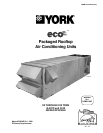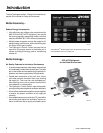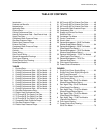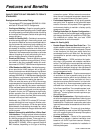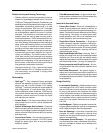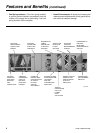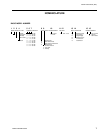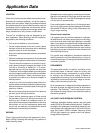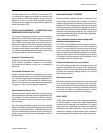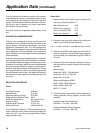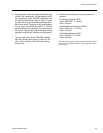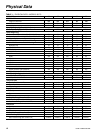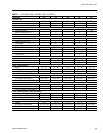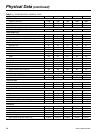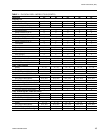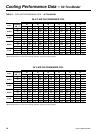
FORM 100.50-EG3 (802)
9
YORK INTERNATIONAL
For VAV applications, the YORK eco
2
unit uses a VFD
to modulate fan speed and maintain a constant duct
static pressure. VFDs offer superior control over the
operation of the unit at part load, and offer the addi-
tional benefits of quieter and more efficient operation
when compared to IGV.
HARSH ENVIRONMENTS – CONDENSER AND
EVAPORATOR COIL PROTECTION
For harsh environmental conditions such as seashore
applications, YORK offers three types of coil protec-
tion: copper fin material, black fin and Technicoat coat-
ings. YORK recommends that for corrosive environ-
ments that copper fins be used to protect the evapora-
tor and/or condenser coils. In areas where chemicals
that can corrode copper are present, such as ammo-
nia, YORK recommends that the black fin or Technicoat
coating be used for maximum protection.
Copper Fin Condenser Coil
Copper fins can be used instead of aluminum for addi-
tional corrosion protection, however it is not suitable
for areas that are subject to acid rain or exposed to
ammonia.
Pre-Coated Condenser Fins
Black fin coating (yellow fin for evaporator fins) is pre-
coated application epoxy on aluminum fin stock to guard
from corrosive agents and insulate against galvanic po-
tential. It is used for mild seashore or industrial loca-
tions. This can provide corrosion resistance comparable
to copper fin coils in typical seashore locations.
Post-Coated Condenser Fins
Technicoat (a post-coated application of epoxy) can be
used for seashore and other corrosive applications with
the exception of strong alkaloides, oxidizers, wet bro-
mide, chlorine and fluorine in concentrations greater
than 100 ppm.
Any of the above suitable options should be selected
based on the particular project design parameters and
related environmental factors. The application should
be further reviewed and approved by the consulting en-
gineer or owner based on their knowledge of the job
site conditions.
BUILDING EXHAUST SYSTEMS
Building exhaust systems are often necessary when
economizers are used to bring in outdoor air. Without
proper building exhaust, the building may become over-
pressurized. The exhaust system maintains the proper
building pressure by expelling the appropriate amount
of air from the building. Exhaust systems are typically
designed to exhaust approximately 10% less air than
what is entering the building. This provides a slight posi-
tive pressure in the building.
100% modulating exhaust with building static
pressure sensing and control
The 100% exhaust system can be configured with ei-
ther control actuated dampers or VFDs for modulating
control. The unit controller monitors the building pres-
sure using a differential pressure transducer and main-
tains the required building static pressure by modulat-
ing the exhaust control. If the building has other means
of exhaust or building pressure is not important, on/off
or barometric control may be used.
Powered exhaust with fan on/off control
The 100% exhaust system can be configured for on/off
operation eliminating the expense of the damper ac-
tuators or VFDs. This exhaust system can be controlled
by either the outside air damper position, or a building
static pressure sensor.
Barometric exhaust
Barometric exhaust can be used when smaller amounts
of air at low static pressure variations within the build-
ing or other means of building exhaust are employed.
Barometric exhaust is commonly used where there are
only small fluctuations in building pressure or where
building static pressure control is not necessary.
ROOF CURB
YORK offers optional roof curbs designed specifically
for the eco
2
footprint. These curbs come disassembled
and require field assembly and installation. For bottom
supply and return openings, the curbs have matching
connections to ease installation. A pipe chase that
matches the rooftop unit pipe chase is also included in
the curb footprint for through-the-curb utility connections.



